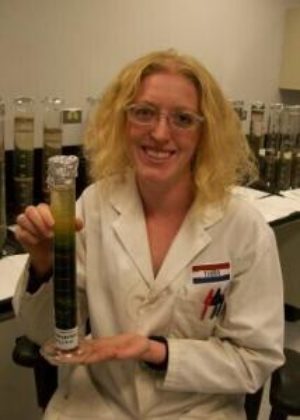Innovation Anthology #353:

Now that scientists know that microbes may play an important role in breaking down residual oil in tailings ponds, the next step is to figure out how to speed up the process.
That’s the basis of several projects microbiologist Tara Penner is researching at Syncrude Canada Ltd, such as this one in conjunction with the Alberta Water Research Institute.
TARA PENNER: And it’s looking at using agricultural waste such as manure, bone meal, celluose like straw, and feeding it to the bacteria so maybe they’ll grow faster and produce more gas and allow this increased densification to happen faster. And so we’re right now still working at kind of the lab scale in settling columns of 1 to 7 litres, but eventually we’d like to take this up to a pilot scale and use larger tubs to see if this is actually a viable technology to use. So this is really exciting because not only would it help out the oil sands industry to manage our tailings better, but it’s also going to help provide value add projects to the agriculture sector.
According to Tara Penner, the research on oil eating microbes is still in its early stages. So Syncrude is collaborating with Genome Canada and Genome Alberta as well as other oil sands companies to discover all they can about the microbes.
Thanks today to Syncrude Canada Ltd
FOR INNOVATION ANTHOLOGY
I’M CHERYL CROUCHER
Guest
,
, , , ,
Sponsor
Syncrude
![]()
Program Date: 2010-11-16